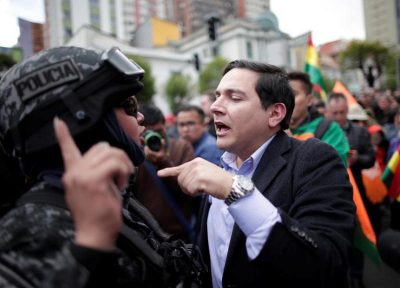Bolivia’s Boiling with Color Revolution Unrest

The narrow re-election of long-serving Bolivian President Evo Morales earlier this month during the first round of voting has been exploited by his internal and external foes alike as the trigger event for inciting preplanned Color Revolution unrest in this lithium-rich landlocked socialist state.
Bolivia’s boiling with Color Revolution unrest after the narrow re-election of long-serving President Evo Morales during the first round of voting earlier this month. The socialist leader is the only survivor of the “Pink Tide” that swept most of South America in the first decade of the 21st century but has since forcibly receded following the US’ covert continental-wide regime change operation colloquially referred to as “Operation Condor 2.0”. Morales’ landlocked country is geostrategically located in the South American heartland and is rich in the lithium that’s recently become an essential component in many modern-day gadgets that form the basis of contemporary society, hence why it’s been targeted for destabilization.
Color Revolutions and the Hybrid Wars that they oftentimes lead to are commonly driven by the external exploitation of preexisting identity differences in diverse states, with Bolivia being no exception. The country is still mostly inhabited by its indigenous people, though severe socio-economic disparities exist within this demographic and between it and the non-indigenous minority, a state of affairs that was institutionalized for decades until Morales’ rise to power rectified this historic wrong and sought to promote equality among the population. The non-indigenous people are predictably much better off than the indigenous ones, and it’s they who historically formed the core of the anti-Morales opposition.
It should also be said that they mostly reside in the eastern lowlands rich in gas while the indigenous population lives mostly in the highlands where lithium is mined, and the former have been vehemently against Morales’ wealth redistribution policies that they feel are unfairly depriving them of the revenue that they believe that they deserve from their natural resource sales. Their activism even briefly took the form of the “Media Luna” (half moon) quasi-separatist movement that might even be revived in the present day if the destabilization intensifies. Having said that, there are also some indigenous people who have turned against Morales for their own reasons, whether out of “leadership fatigue” or the Amazon rainforest fires.
Returning to the present moment, this state of affairs made it relatively easy for external forces to encourage unrest after the latest election, especially since Morales’ campaign for a fourth term was previously denied after he narrowly lost a referendum on this issue a few years ago but was then eventually overturned by the courts that allowed him to run again. This backdrop seeded doubts about his legitimacy, which were watered by the brief pause in reporting the recent election results that ultimately found that he won 10% more votes than his closest opponent by a razor-thin margin and thus avoided a second round that could have seen the anti-Morales forces pool their efforts into collectively defeating him as was most probably planned in advance.
It’s for this reason why the US and its regional vassals are doing everything that they can to discredit his latest re-election since they bet on the vote going to a second round where they believed that they had the best chance of “democratically” unseating him. The ethno-political and domestic regional context within the country makes it ripe for Color Revolution unrest, which serves the strategic goal of either overthrowing Morales or compelling him into cooperating with the US to the point of becoming yet another of its proxies in order to relieve the Hybrid War pressure that’s being increasingly put to bear on his country. The greatest obstacle to this plan, however, is that since Morales has many passionate supporters who would fight for his presidency.
He’s done more than any leader in his country’s history to right the historical wrongs of ethno-regional inequality and finally bring dignity to Bolivia’s majority-indigenous population through his effective implementation of socialist policies, so millions of previously destitute people feel like they literally have everything to lose if he’s illegally deposed and the progress that he made over the past decade and a half is rolled back to the old days of neo-colonialism. Bolivia could therefore very well be on the path to civil war in the worst-case scenario, especially since opposition leader Carlos Mesa already declared that he won’t recognize the outcome of the OAS’ audit of the recent election, which strongly suggests that powerful forces are pushing him to provoke a Color Revolution that could rival the ongoing destabilization in Venezuela and ultimately dwarf the humanitarian crisis that it created by virtue of the landlocked country’s greater vulnerability to logistical disruptions.
Note to readers: please click the share buttons above or below. Forward this article to your email lists. Crosspost on your blog site, internet forums. etc.
This article was originally published on OneWorld.
Andrew Korybko is an American Moscow-based political analyst specializing in the relationship between the US strategy in Afro-Eurasia, China’s One Belt One Road global vision of New Silk Road connectivity, and Hybrid Warfare. He is a frequent contributor to Global Research.
Featured image is from OneWorld

